International Day of Happiness is March 20. The United Nations proclaimed this day in 2012 at the request of Bhutan, a country that actually releases its own annual happiness index.
So what does it mean to have such a day? "It's a day to be happy, of course!" the U.N. says — "a way to recognize the importance of happiness in the lives of people around the world."
Since 2023 so far has been beset by conflict, natural disasters and a continuing pandemic, maybe celebrating the importance of happiness isn't as hokey as it sounds.
Happiness can stem from economic well-being, the U.N. further notes. But this year, the International Day of Happiness has embraced themes that do not depend on material well-being: "Be mindful. Be grateful. Be kind."
We reached out to photographers around the world who've contributed to our blog, asking for photos from their archive that capture gratitude and kindness.
The images they sent warmed our hearts. They reaffirmed the joy to be found in acts of kindness. They made us happy. We hope they make you happy, too.
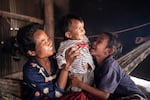
Ten-month-old Ahmin Esas, who was born with clubfoot, shares a moment with his mother and brother in the family's home near Battambang, Cambodia. As a single parent with limited means, his mother, Pho Sok overcame many challenges to ensure her son could receive the treatment he needed.
Tommy Trenchard
Ten-month-old Ahmin Esas, who was born with clubfoot, shares a joyful moment with his mother and brother in the family's home near Battambang, Cambodia, in February 2023. His mother, Pho Sok, had believed he'd never be able to walk or live independently until a doctor told her the condition was treatable. A single parent, Sok earns about $4 a week stripping down palm fronds and selling the fibers to a broom maker. To get her son treatment, which involved placing his feet in new plaster casts every week for the first few months of his life, she borrowed money and hitched rides on the back of her neighbors' motorbikes to the clinic, which was run by a local NGO, NextSteps. "I was desperate to get his feet healed and for him to be able to live a good life," she said. If he wears a brace at night for the next few years, she says, he'll be fully mobile.

Jeremiah Balan (Haiti) likes to walk through Prospect Park: he sits in a quiet spot, turns on his speakers, listens to gospel and shares cookies with the ducks on the lake. New York, USA, July 2022.
Yolanda Escobar Jiménez
"I was visiting New York City in August, 2022. Walking through Prospect Park I came across Jeremiah Balan and was struck by how much fun he was having by the lake, feeding the ducks," says photographer Yolanda Escobar Jiménez. Originally from Haiti, Balan told her that every day when he gets off work, he walks through Prospect Park to relax. He finds a quiet spot to sit, turns on his speakers to listen to gospel and enjoys nature.
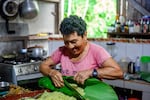
04. Pasio Caballero lives in Pucallpillo, in the district of Huicungo, San Martin. Pasio's name is Pasiona (Passion) and I am convinced that this is no coincidence. Several people in the community depend on her for their three meals a day and Pasio meets and exceeds this every time. It is the day before the traditional holiday of San Juan and Pasio, besides making the meals of the day, also goes to cook juanes for the feast. It is a hard task but Pasio is unstoppable, motivated by the goodness of her heart and her willingness to make people happy through what she knows best: her cooking. She is living proof that a homemade meal can make the heart warmer.
Macarena Tabja
Pasio Caballero lives in the tiny town of Pucallpillo, Peru. Pasio — short for Pasiona (Passion) — cooks three meals a day for some of her neighbors, who depend on that food to survive. In June 2022, the day before the traditional holiday of San Juan, Pasio was cooking juanes for a feast — a traditional dish from the Amazon with chicken, rice, olives, spices and an egg, all wrapped in a leaf from a bijao tree. It is a hard task but photographer Macarena Tabja says Pasio is unstoppable, motivated by the goodness of her heart and her eagerness to make people happy through what she knows best: her cooking.
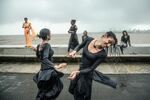
Izna and Saba, members of Mumbai’s disenfranchised and discriminated against, Transgender or Hijra community, dance with each other in a state of pure happiness to the background of their friends’ laughter and smiling faces. The reason for their happiness is gratitude and sere joy for the high tide and the rains that baptise the city of Mumbai during its monsoon season. Photographing and interacting with these five friends, was a reminder to me to not only have gratitude for the larger and more significant events in my life, but of the smaller everyday moments of life as well. Also, that both happiness and gratitude are interlinked, and best when experienced and shared with others.
Viraj Nayer
Izna and Saba and friends dance with joy in August 2022 for the high tide and the rains of the monsoon season, bringing relief to Mumbai from summer heat. They're members of Mumbai's transgender, or Hijra, community, which faces prejudice and discrimination. "Photographing and interacting with these friends was a reminder to me to not only have gratitude for the larger and more significant events in my life, but of the smaller everyday moments of life as well," says photographer Viraj Nayar. "Also, that both happiness and gratitude are interlinked and best when experienced and shared with others."
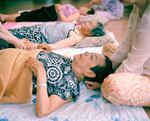
Kim Hwa Seon, Park Ok Sean and Hang Il Chul receive massages. The House of Sharing is a residence outside of Seoul, South Korea, for former Korean “comfort women,” a euphemism for women (mostly teenagers) who were forced into sexual slavery for the Japanese Imperial Army during the Second World War. These days, Koreans endearingly refer to them as “halmonis” (grandmothers). Today, ten known survivors remain. During my stay at The House of Sharing, the hamonis had a constant stream of visitors, from grade school students wanting to learn more about their histories, which has been subject to denial and erasure by the Japanese government, to women who came regularly to give them massages. When a young mother and her two daughters gently placed their hands on Kim Hwa Seon Halmoni and began massaging her soft skin, she closed her eyes and her thoughts and words drifted away into a different space. When I think about kindness, I think about “jeong”. “Jeong” is a Korean word and concept that connects Koreans to each other in collective social responsibility through acts of caring, empathy and gratitude. It encourages people to be present in the moment and cultivate deeper, more meaningful connections. In witnessing the hamonis receive massages from younger generations of Korean women, I could feel the healing of ancestral wounds. I could feel jeong.
Arin Yoon
The House of Sharing is a residence outside of Seoul, South Korea, for former "comfort women," a euphemism for women (mostly teenagers) who were forced into sexual slavery for the Japanese army during the World War II. These days, Koreans endearingly call them halmonis (grandmothers). "During my stay at The House of Sharing in 2010, the halmonis had a constant stream of visitors, from grade school students wanting to learn more about their histories, which has been subject to denial and erasure by the Japanese government, to women who came regularly to give them massages," says photographer Arin Yoon. "When a young mother and her two daughters gently placed their hands on Kim Hwa Seon Halmoni and began massaging her soft skin, she closed her eyes and her thoughts and words drifted away into a different space. When I think about kindness, I think about 정 jeong -- a Korean concept that connects Koreans to each other in collective social responsibility through acts of caring, empathy and gratitude. It encourages people to be present in the moment and cultivate deeper, more meaningful connections. In witnessing the halmonis receive massages from younger generations of Korean women, I could feel the healing of old and ancestral wounds. I could feel jeong."
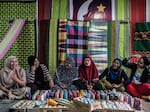
The Sinagtala weavers (left to right) Naidah, Jalilah, Salam Sybil, Soraida, Salam Abdullah, and LJ share a joyful moment after receiving new threads from a donor in Marawi, Philippines, on December 27, 2017. The fighting in Marawi might be over, but the devastating aftermath remains. Six Muslim women try to reclaim their dignity and joy by returning to an almost forgotten tradition of weaving traditional textiles.
Xyza Bacani
The Sinagtala Warrior Weavers (left to right) Naidah, Jalilah, Salam Sybil, Soraida, Salam Abdullah and LJ, share a joyful moment after receiving new threads from a donor in Marawi, Philippines, on December 27, 2017.
The women are Maranao, a Muslim indigenous group in the Philippines. They lost their homes during the conflict between the Philippine military and the ISIS-inspired Maute group in 2017.
Sinagtala means "starlight" in Tagalog. For the women, the word symbolizes guidance and hope in times of darkness. "We started training [in weaving] with no pay just to forget the scenes of the fight that keeps on haunting us and at the same time [learn a skill to] earn an honest and decent living," says Naidah. The act of creating something beautiful with their hands and seeing the finished product is fulfilling and satisfying, she says. As of late 2022, many Maranao are still waiting to return home.
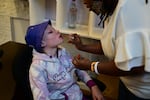
Gordwin Odhiambo
Beatrice Alosa, 22, gets made up for an event sponsored by David Avido, a noted Kenyan fashion designer.
Avido, who's from Nairobi's Kibera slum, is famous for his Lookslike Avido label and has dressed celebrities and influencers, including the president of Kenya. He also brings fashion and beauty to those in the community who may face discrimination — like Alosa. In Kenya and other countries, people with albinism face discrimination because of their skin color and sometimes are the targets of violence. Avido also reaches out to those with physical disabilities, including people who are deaf, and to people with the skin condition vitiligo and to the transgender community.
Avido, 25, isn't just a fashionista. He was one of 68 Kenyans recognized by the president of Kenya with the Uzalendo Award in 2020 for outstanding community service during the COVID-19 pandemic. He spearheaded a free mask initiative that provided nearly 23,000 masks to Nairobi residents and has worked with friends and partners to distribute food to hundreds of families in Kibera.
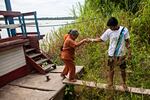
©PATRICIO CROOKER ENERO 2022 BENI BOLIVIA Consulta medica en el Barco Hospital “Esperanza” de Caritas Guayaramerin Comunidad Barranco Colorado Río Mamoré
Patricio Crooker
In the Amazon region of Bolivia, near the Brazilian border, a hospital boat named Esperanza — Spanish for hope — visits some of the communities along the Mamore River, giving free medical care to about 60 people a day. Many of the patients are very old and have difficulty getting to the boat on the shores of the river. In January 2022, this young person helps older people get on and off the boat while waiting for a check-up himself.
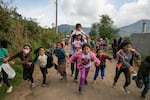
Ana Hernández, coordinator of the association Coincidir, an organization formed by activists for the rights of children, adolescents and youth, plays with a group of girls in the village of Panimaquín, Guatemala, May 6, 2022. Photo/Luis Echeverria
Luis Echeverría
Ana Hernández plays with a group of girls in the village of Panimaquín, Guatemala in May 2022. She's the coordinator of the association Coincidir, a charity formed by activists for the rights of youth and to address the issue of gender violence. The charity aims to teach girls to swim, ride and repair bicycles and defend themselves. In this photograph, the girls had just finished their bicycle class and Hernández proposed a race back to the headquarters.
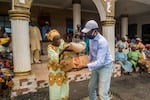
Bayo Omoboriowo distributes food items and beverages for the less privileged, elderly and vulnerable people in his home town of Ijero-Ekiti, in Ekiti State, Nigeria, during the government-imposed lockdown to prevent the spread of the coronavirus. These communities often earn a living from petty trades, farming and commercial transportation, yet the pandemic has prevented people from earning a regular income for almost a month. Normally, Bayo is the official photographer for the President of Nigeria. His wish to improve the lives of people in society was a major driving force behind putting together this social intervention project.
Obasola Amigbola
Bayo Omoboriowo is official photographer for the president of Nigeria but he has a second mission — improving the lives of people in need. During the COVID lockdown, he donated and distributed food and beverages in his hometown of Ijero-Ekiti, providing nourishment for those who couldn't work because of the pandemic.

Black Mamba anti-poaching unit member Nkateko (left) and Bush Babies education officer Lewyn (right) laugh after realising that three of the students in their class are the children of fellow Black Mambas, Maseke Primary School, South Africa, 2017. The Black Mambas are an all-female unit made up of local women who wanted to help protect the natural heritage of South Africa. Their approach is radically different to that of traditional anti-poaching efforts which rely on the threat of force and extreme violence. The main tools in the Mambas’ arsenal are empathy and kindness, rather than the guns and helicopters employed by rangers. At Balule Nature Reserve, the latter are only used in extreme situations. The Mambas prefer to use visual policing – daily foot patrols through the reserve – to check on the local landscape and the animals that live here, and to build an intimate relationship with the local environment. They know every tree in the reserve, they care for and release the trapped and injured animals they find, and watch out for each other as they check the endless fence line that surrounds Balule. Nkateko and her fellow Mambas use the fact that they live in the same villages as many of the poachers do, to engage with and confront them as mothers, sisters or friends rather than as soldiers or rangers. They visit schools to teach children about the importance of wildlife conservation. And, they serve as role models in their own communities – aware that food insecurity is a significant driver for poachers, Nkateko started a feeding program in her own village. By creating an environmentally literate community which appreciates the value of keeping animals alive in their natural habitats, the Mambas want to make sure that South Africa’s wildlife will be around long enough for their own children to appreciate.
Julia Gunther
The women of South Africa's all-female Black Mamba anti-poaching unit love animals — and want to teach young people to appreciate nature. (Pictured above, two members are happy to see that three of the students in a class they're visiting in 2017 are the kids of Black Mamba members.) The women make daily foot patrols at the Balule Nature Reserve, where they inspect the fences that line the property and care for injured animals. They live in the same villages as many of the poachers and engage with them as mothers, sisters or friends rather than as soldiers or rangers, telling them how important it is to protect the animals and not capture them.
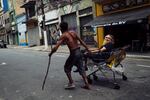
Cracolândia (Crackland), located in downtown São Paulo, Brazil, is the largest open-air crack dealing and use scene in South America. Indio Badaross and Yori are two members of the Birico collective, an association of artists from different social conditions united to strengthen projects in this stigmatized territory. Even if their style is different, they both paint on materials they find in the street. It is not hard to see them around the neighborhood. Badaross has a recycling trolley and today he is carrying his friend, who has been walking only on crutches for years due to a health problem.
Luca Meola
Indio Badaross (who on this day is wearing only one shoe) gives a ride to his friend Yori, who needs crutches to get around. They're members of the Birico collective, an association of artists, who live near Cracolândia (Crackland), an open-air drug market in downtown São Paulo, Brazil, and paint on materials they find in the street. A drug user, Badaross earns money mainly by recycling garbage. Yori makes and sells small paintings. They both say they paint to express their pain and suffering.
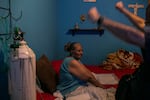
August 20, 2020 - Dr. Gustavo Gutierrez checks on Marta Navarro Morales, 63, in her home in Matamoros. He gesticulates wildly as he reminds her to exercise her arms so that she doesn't lose muscle laying in bed. Navarro survived breast cancer, and Dr. Gutierrez says her covid19 case, which began nearly a month ago, has improved drastically. Her makes her smile, calling her a VIP patient. Dr. Gustavo Gutierrez, an emergency medicine doctor living in Reynosa, Tamaulipas, is treating covid19 patients in their homes (as well as the hospitals he works in) as the pandemic rages on along the border towns in Tamaulipas. His phone never stops ringing or buzzing, and he sometimes goes 24 hours without sleep juggling his time visiting patients at home and his shifts at the hospitals. Having already battled covid himself, he brings his personal experience along with his medical expertise in to his treatment of patients, many of whom are afraid of going to the hospital. Meghan Dhaliwal for The New York Times
Meghan Dhaliwal
Dr. Gustavo Gutiérrez checks on Marta Navarro Morales, 63, in her home in Matamoros, Mexico. In August 2020, Navarro was recovering from a case of COVID-19 she contracted the month before. He gestures as he reminds Navarro — a breast cancer survivor — to exercise so she can keep up her strength. The doctor believes in house calls — some patients are afraid to go to the hospital. And he goes beyond healing — he makes Navarro smile, calling her a VIP patient.
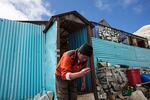
Patricio Crooker
Patricio Crooker
A mountain guide from the indigenous Aymara people performs a ritual to give thanks in a shelter in the Huayna Potosí Mountain in the Bolivian Andes in March 2019. Nearly 20,000 feet above sea level, it's one of the most climbed mountains in the Bolivian Andes. The guide uses balloons, flower petals, firecrackers and alcohol to give thanks to Pachamama — Mother Earth — for what she provides to humanity and to request good luck for future expeditions.
Copyright 2023 NPR. To see more, visit https://www.npr.org.